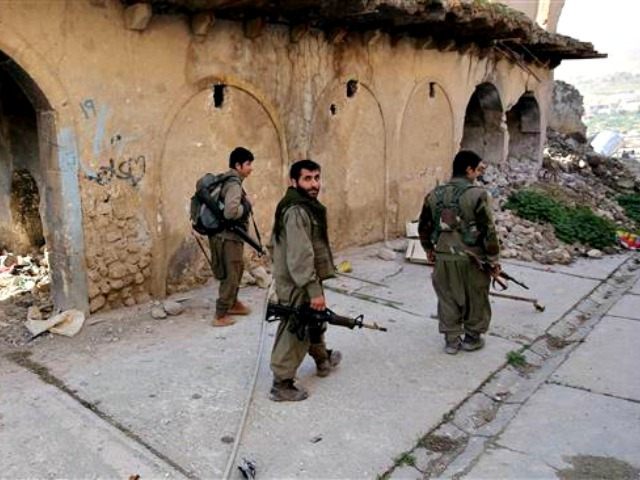The Kurdistan Workers’ Party (PKK), a U.S.-designated terrorist organization, has promised to evacuate the Sinjar area of northern Iraq once the Islamic State ceases to be a threat to the local Yazidi population. This statement follows days of reports that internal disputes between the PKK and other Kurdish groups have stalled a planned assault on ISIS.
According to Kurdish news outlet Rudaw, PKK officials claim they will withdraw from northern Iraq once the Islamic State is eliminated. Currently, ISIS controls Sinjar City and much of the surrounding area after a deadly offensive on the Yazidi population in summer 2014. The Islamic State considers Yazidis, whose religion is a mix of Islam, Zoroastrianism, and Christianity, of worshipping the devil and have embarked upon a campaign against them Yazidi activists hope the International Criminal Court will identify as genocide.
Rudaw quotes PKK commander Haval Agid as saying that the group would voluntarily leave the region and withdraw to Syria and Turkey once they are satisfied that ISIS no longer poses a threat to the region. Agid commands 500 PKK soldiers and says he has told the Kurdistan Regional Government (KRG), headquartered in Erbil, Iraq, of his decision to depart following the defeat of ISIS.
Agid noted, however, that his forces expect to have a role in the liberation of Sinjar. “We want to participate in the fight for Shingal. We are not a foreign force,” he said.
The PKK are one of a number of rival militias in the area, the largest of which is the KRG’s Peshmerga forces, which Rudaw estimates at about 20,000 in Sinjar. Yazidi militias trained and supported by both the PKK and the Peshmerga are also operating in the region.
The KRG considers itself the only legitimate Kurdish government of Iraq and has repeatedly called for the PKK to withdraw from the region. In an interview in August, Masrour Barzani, son of the president and head of Kurdistan’s intelligence agency, argued that they are foreign invaders taking up a fight to which they are not invited, and asked of PKK leaders: “Would the PKK be happy if a Kurdish political party inside Iraq meddled in the affairs of Diyarbakir or Mardin?” Diyarbakir and Mardin are Turkish Kurdish-majority cities with major PKK presences.
“The PKK are from Turkey, and others are from Syria. We are grateful for heir help but once the fight is over, this is our land,” KDP fighter Captain Mohamad Dusky added.
In October, Peshmerga leaders issued a statement barring any militias except the Peshmerga from fighting in the mission to retake Sinjar, specifically citing the PKK and Syrian Kurdish People’s Protection Units (YPG/YPJ) and demanding they leave the area.
The PKK, until now, has largely ignored these calls, as they see ethnic Kurds as one nation. “We don’t consider our forces as external forces… We are Kurds, Sinjar is a Kurdish city. If they [the KDP] want us to leave, where should we go, Europe?” Amara Aelul, a PKK guerrilla, told the National Post. The PKK considers Yazidis Kurdish people, as many speak the Kurdish language and live in Kurdish-controlled areas.
Many Yazidis have come around to the PKK’s interpretation of where the borders among Kurdish groups end, as the PKK played a pivotal role in fighting the Islamic State in 2014. As the National Post notes, the Peshmerga largely retreated before ISIS during their assault on Sinjar, resulting in the death, rape, and enslavement of thousands of Yazidis. The PKK remained in the area, establishing makeshift refugee care centers that provide food, water, and even some schooling for children.
The Yazidi forces that remain loyal to the Peshmerga accused the PKK of stalling the operation to retake Sinjar last week. Exiled Yazidis are growing desperate to see ISIS eradicated from their homes as the harsh Iraqi winter approaches. “The PKK is the main reason behind the delay of the Shingal operation… Let them go and save the Kurds in Syria and Turkey, but we will never let them gain power over Shingal,” Yazidi Peshmerga leader Qasim Shesho said last week.
As exclusive Breitbart News video demonstrated last week, the Islamic State operates with almost no challenge to its authority in Sinjar. From Peshmerga-controlled mountaintops, one can see ISIS convoys shipping fuel and weapons into Sinjar City, the majority of which they control. The distance between Kurdish fighters and ISIS jihadis is so close that sometimes, one fighter says, “we curse at them in both Arabic and Kurdish and they curse back at us.” Rudaw estimates these distances at less than 50 meters, or about 164 feet.
Reports in Kurdish news outlets conflict with each other regarding just how imminent the mission to rescue Sinjar really is. Bas News, a Kurdish outlet, quotes one Peshmerga commander stating his troops are “more than ready” to attack, while citing another who says Yazidis should not expect the mission to begin anytime soon.
Yazidi refugees, in the meantime, prepare for a second winter away from home. “We thought before the winter the coalition and Kurdish forces would liberate our city, but they did nothing,” says former Sinjar resident Xatem Omer. “No one cares about us.”

COMMENTS
Please let us know if you're having issues with commenting.